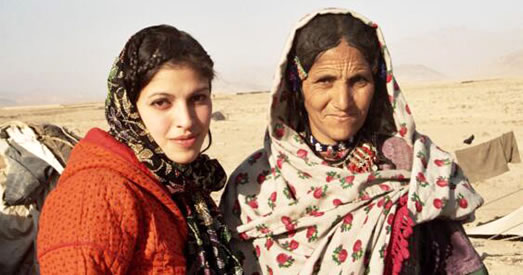FILM: We Came Home
 Ariana Delawari’s biographical documentary We Came Home begins by tracing her rich and complex past and present, starting with her grandparents’ unlikely marriage, a mother from Sicily, a father from Afghanistan, to her unique moment in the present as an Afghan American, daughter to another unlikely union between an Afghan father and Jersey Shore mother. This biographical introduction, accompanied by a narrative voiceover, makes this all seem familiar however singular to a US audience.
Ariana Delawari’s biographical documentary We Came Home begins by tracing her rich and complex past and present, starting with her grandparents’ unlikely marriage, a mother from Sicily, a father from Afghanistan, to her unique moment in the present as an Afghan American, daughter to another unlikely union between an Afghan father and Jersey Shore mother. This biographical introduction, accompanied by a narrative voiceover, makes this all seem familiar however singular to a US audience.
Yet We Came Home is much more than a bio film on the immigrant experience in a globally migrating world. This documentary touches on politically volatile moments in Afghan history, from Soviet intervention to the Taliban and to 9/11. Emerging from all this historical damage is one family’s history of a sense of “home,” between here, Los Angeles, and there, Kabul, Afghanistan. And it is from this sense of here that we see the Delawaris settling in Los Angeles, listening to Madonna, but also unsettled too, as the family, along with Afghani self-exiles, entertains and faces the joys and sorrows of a damaged Afghani culture.
Soon we see that cultural loss finds voice in Ariana Delawari. She is an L.A. musician, playing an already unique style, in part, inflected by Afghani sounds. This influence is further implied by Ariana’s decision to preserve her father’s rich musical heritage, sensing it is threatened by not only the Taliban, as music was banned by the Taliban, but also by the loss of its musicians (it’s a dangerous profession). She soon boards a plane bound for Kabul, Afghanistan, with her band: guitarist Max Guirand and violinist Paloma Udovic. Ariana’s mission becomes theirs: to record an album in her parents’ home with three Afghan Ustads: a tabla player, a rabab player and the last living master of the dilruba.
Once there, we see some of the difficulties of production because of lack of power and Taliban bombings in Kabul. While inside her parents’ dining room, the musicians set up a makeshift studio and record tracks to what will become the band’s album Lions of Panjshir. “Home” in the title of the documentary is also the central theme in the recordings.
Ariana’s home coming is figurative because she is American, so it is more her father’s home coming, as he is Afghan. Both senses of home are woven contrapuntally, visually and temporally, because Ariana’s story is written in conversation between her life here in Los Angeles and her life there in Kabul and those two threads are further entwined with her father’s mission of rebuilding the country as he knows how, through banking. Amidst their work, the fear of the Taliban loom over their project as scenes between bombings in Kabul and Ariana’s recording in America flash back and forth, and these scenes are further underlined by headline news clippings that act as footnotes of history in order to press reality of the present into our sense of her project.
The documentary ends as it began, in a sense, fraught with the tensions of (re)building and recovering a past and allowing it a home in the present. It is not only the artistic but the political dimensions being narrated and containing a relevant history to there and here.
WE CAME HOME – Official Trailer from Ariana Delawari on Vimeo.
For more information on We Came Home, please visit wecamehome.com.











